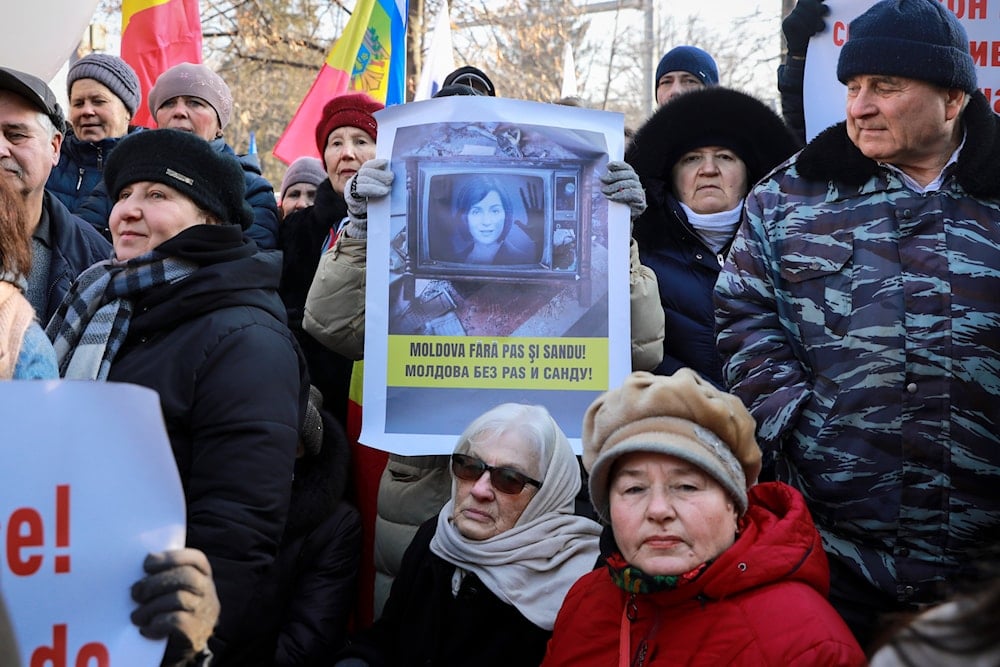Moldovan MP accuses police of brutality against demonstrators
Moldovan police is accused of brutality as opposition protests in Chisinau and other cities demand release of political prisoners and an end to repression.
-

A woman holds a banner showing the country's president, Maia Sandu, that reads "Moldova without PAS and Sandu" during a protest against the governing Party of Action and Solidarity (PAS) in Chisinau, Moldova, Thursday, Feb 1, 2024. (AP Photo/Aurel Obreja)
Moldova is witnessing a wave of protests met with increasing police brutality, as opposition groups accuse President Maia Sandu’s administration of systematically silencing dissent. On August 16, rallies in Chisinau were violently dispersed, with police dismantling the tent camp set up by the protesters.
The demonstrations, organized by the opposition Pobeda (Victory) bloc, demanded the release of political prisoners and an end to what they described as repression against government critics.
According to Regina Apostolova, a parliamentarian from the Pobeda bloc, law enforcement has gone far beyond its mandate. “What has been happening at peaceful rallies for the past two weeks is beyond all bounds. The police are brutally treating people who come to the protests, and some who have nothing to do with the rallies are facing the same treatment,” she told reporters.
She criticized the authorities for targeting ordinary citizens rather than focusing on criminal activity, saying that police were “fighting grandmas, grandpas and young people.”
Wider clampdown on the opposition
The crackdown is part of a broader campaign against opposition forces. Earlier this year, the head of Gagauzia autonomy, Yevgenia Gutsul, was detained at Chisinau Airport in March and sentenced in August to seven years in prison over alleged illegal financing linked to the banned Shor Party. Other opposition figures, including Svetlana Popan and Alexander Nesterovci, have also received lengthy prison sentences.
Opposition lawmakers have repeatedly been detained at airports after visiting Russia, fueling accusations that the government is persecuting political opponents under the guise of national security.
In August alone, police detained 69 demonstrators during anti-government rallies, filing 148 violation reports. Days later, protesters gathered outside the Interior Ministry, condemning police mistreatment and demanding the release of detainees.
Media restrictions and censorship
Alongside political repression, Moldova’s government has tightened control over the media. Authorities have blocked more than 100 Telegram channels and shut down over a dozen outlets, including Sputnik Moldova and several major television stations. Critics argue that such measures amount to censorship aimed at silencing voices ahead of next year’s parliamentary elections.
The crackdown has drawn concern from international observers. The OSCE criticized the banning of parties and the suspension of television stations, while the Kremlin condemned Gutsul’s detention as politically motivated.
Public dissatisfaction with Maia Sandu’s government is growing. Recent polls show that more than half of Moldovans believe the country is heading in the wrong direction, with around 65% supporting a change in government. Economic hardships, soaring inflation, and the government’s pro-EU stance have fueled unrest, with opposition parties warning that Moldova risks sliding into authoritarianism.
Moldova’s bid to join the European Union
Moldova is advancing one of the fastest EU accession processes in the bloc’s history. Following a narrow referendum in October 2024, with 50.39% support, that enshrined EU membership as a constitutional objective, the government has accelerated reforms across governance, the judiciary, and the economy.
Nonetheless, enshrining EU membership as a constitutional objective meant that any opposition to the EU was regarded as unconstitutional. Opposition parties accuse President Maia Sandu of using the European agenda to target rivals, while critics warn that persistent corruption and repression of dissent undermine the country’s democratic credentials.
The European Commission has praised Moldova’s progress, highlighting its ambitious target to finalize technical accession work by 2027, with full membership projected for 2029. To support this, Brussels approved a €1.9 billion reform and growth package aimed at modernizing infrastructure, creating jobs, and boosting energy independence.
Despite this momentum, the path to accession remains politically divisive. Domestically, only a slim majority supports EU membership, with the Moldovan diaspora playing a decisive role in passing the referendum.

 4 Min Read
4 Min Read









